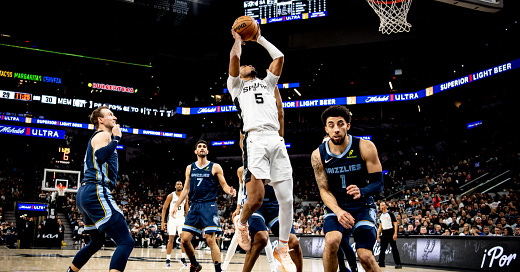What 'positionless' basketball actually looks like
Two beatdowns at the hands of the Grizzlies this week left the Spurs with a better understanding of how critical it is to find a team identity.
The NBA has long been a league of borrowed offensive styles, of latching on to that which stands the test of time through variations that account for defensive adjustments.
We see the pick and roll on repeat every single night, decades after Jerry Sloan, John Stockton and Karl Malone popularized it in the 1990s; Tex Winter’s triangle offense, the well-known system of Phil Jackson’s Bulls and Lakers, still remains prevalent as a concept that’s branched out into different shapes and forms as the game has evolved; even elements of the Princeton offense are staples of modern-day gameplans about 60 years after its introduction.
In recent years, the term ‘positionless’ has made its way prominently into the basketball lexicon as a roster-building approach. But as the likes of San Antonio and other rebuilding teams have repeatedly used it as an explanation for their drafting strategies, the word has become almost taboo for many on the grounds of, ‘What the hell does it even mean, functionally? How does one run a positionless offense?’
Well, look no further than the Memphis Grizzlies, who are currently playing a style of basketball that would make the :07 Seconds or Less Suns seem plodding. Everyone can handle, everyone can pass, (almost) everyone can shoot, everyone can rebound, and everyone can play defense. Because of that, they can hit opponents from almost every angle imaginable, and they want to do so as fast as humanly possible — before the defense can set itself, and without the aid of set plays in the halfcourt.
The result is one of the purest blends of playground basketball and shot-making there is in the league today, and as San Antonio found out this week, it’s a style that can trap teams if they’re not careful. Because everyone wants to play that way, even if few are this well-equipped to do so.
Keep reading with a 7-day free trial
Subscribe to Corporate Knowledge to keep reading this post and get 7 days of free access to the full post archives.




